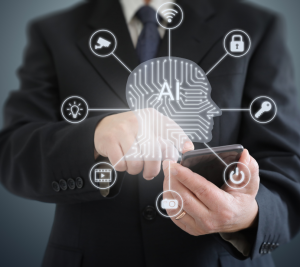By Olivia Robertson
In light of Vanderbilt University’s new College of Connected Computing, Jesse A. Blocher, Associate Professor of the Practice of Data Science and Finance at Vanderbilt Business, discusses what to expect from the college, his thoughts on how to interact with AI, and how businesses are using AI in their day-to-day to improve efficiency and employee satisfaction.
The Big Question: What will AI change, and how should we respond?
Where do we begin when thinking about using AI?
Before digging into what AI will change and how businesses and individuals should react, it is important to understand how we should think about AI. AI is a general-purpose technology, like the internet.
 Blocher suggests approaching AI like the internet in the late 1990s. AI is still so new that we are figuring out what it is, and we still need to learn the right questions to ask. Just like it took years to develop and refine advanced uses of the internet, AI will go through a similar period of growth and learning. “Right now, we’re essentially doing the same things we’ve always done, just better and faster, thanks to AI,” states Blocher. “This is just phase 0—we don’t know what all it can do yet.” In saying this, Blocher nods to the notion that we do not yet know what business models or groundbreaking ideas will emerge that will completely change our understanding of AI’s potential. This evolution will unfold over the next 5-10 years, and much of this innovative work will be driven by institutions like Vanderbilt’s College of Connected Computing.
Blocher suggests approaching AI like the internet in the late 1990s. AI is still so new that we are figuring out what it is, and we still need to learn the right questions to ask. Just like it took years to develop and refine advanced uses of the internet, AI will go through a similar period of growth and learning. “Right now, we’re essentially doing the same things we’ve always done, just better and faster, thanks to AI,” states Blocher. “This is just phase 0—we don’t know what all it can do yet.” In saying this, Blocher nods to the notion that we do not yet know what business models or groundbreaking ideas will emerge that will completely change our understanding of AI’s potential. This evolution will unfold over the next 5-10 years, and much of this innovative work will be driven by institutions like Vanderbilt’s College of Connected Computing.
What should businesses do in response to advancements in AI?
Blocher provides insight regarding how businesses can react to the continually increasing discoveries about AI and their implementation into everyday life, touching on protecting proprietary information, employee satisfaction, and competition.
Ensure Protecting of Proprietary Information While Using AI
When using the free version of AI chat models, users take on the responsibility that AI models will train on the information they share to fuel model improvement. Therefore, there are concerns proprietary information entered into these chat interfaces puts that data in a position to be compromised. With paid subscriptions, there are assurances that training is not performed on user’s text input, but Blocher says you should be careful.
Instead, Blocher recommends businesses use AI to their advantage without putting confidential information at risk by building their own internal AI platform. Rather than purchasing a bulk AI subscription for all employees, the company should contract with companies like Microsoft or Amazon to build their platform with a chat interface inside a protected firewall. By putting AI into the hands of its employees, a company can learn the best use cases for this technology and, from there, create custom solutions to drive value while maintaining confidentiality.

Create a Culture Centered Around Protected Discovery
Many of AI’s best uses will be discovered by employees learning more about what the technology can do as they use it. Businesses need to create a culture where employees feel safe to share how AI has made their jobs easier without fear of being replaced with automation.
Blocher notes that many people fear that AI will take their job, and if not their job, then their friend’s job. He provides an example, stating, “If you are in the accounting department, and you figure out this cool new AI thing that makes your job easier, you aren’t going to feel happy if the business implements your idea and 2 of your friends get let go as a result.” Many employees are using AI in secret to protect their jobs and livelihoods from being replaced by AI. With that in mind, what can firms do to assure their employees that AI will not push them out? Acknowledging that he is not an organizational behavior expert, Blocher suggests that for both the firm and its employees to reap the benefits of increased efficiency via AI in the workplace, the firm could implement shorter work weeks without a decrease in pay. This way, as employees find more ways to streamline their workflow and, as a result, simplify the company’s workflow as a whole, they are rewarded with what many believe AI was made for: life made easier. Blocher believes this is the immediate path forward, where AI enhances human ability instead of replacing it. If businesses can understand the benefits of blending human power and AI power and promote the disclosed use of AI among their employees by ensuring job security and increased benefits, they will likely see a significant increase in productivity and employee satisfaction.
What does this mean for the future?
It is hard to know where AI will take us—just like it was hard to know the future capabilities of the internet as it became widely available. However, we can learn from Blocher and other experts how we can best operate as humankind is still discovering what this technological phenomenon has to offer. With protecting ourselves, our information, and our businesses in mind, we can learn more about how AI can make our lives, both personal and professional, better across many different fields.
Vanderbilt’s College of Connected Computing

Jesse A. Blocher
Vanderbilt University is taking a big step into the future by launching its new College of Connected Computing. This new college is all about the exciting worlds of computing, AI, and data science—it is a hub for cutting-edge research and education in these rapidly growing fields. By encouraging collaboration across different disciplines and engaging with the latest technology, the College of Connected Computing aims to give students the tools they need to thrive in our digital world. As the need for AI and data science experts keeps growing, Vanderbilt’s newest addition will become a key player in shaping the future of tech and innovation.
“This isn’t going to be just another college of computing,” says Blocher. “The idea is that this college will have a bigger impact on the parts of the university that are not as computational, such as archaeology, law, sociology, political science—those are the areas where there is much to be gained.” Blocher highlights that this college is coming at a perfect time because data, data science, and AI will eventually impact every field, and the addition of the College of Connected Computing shows that Vanderbilt is taking early measures to make this technology a priority.